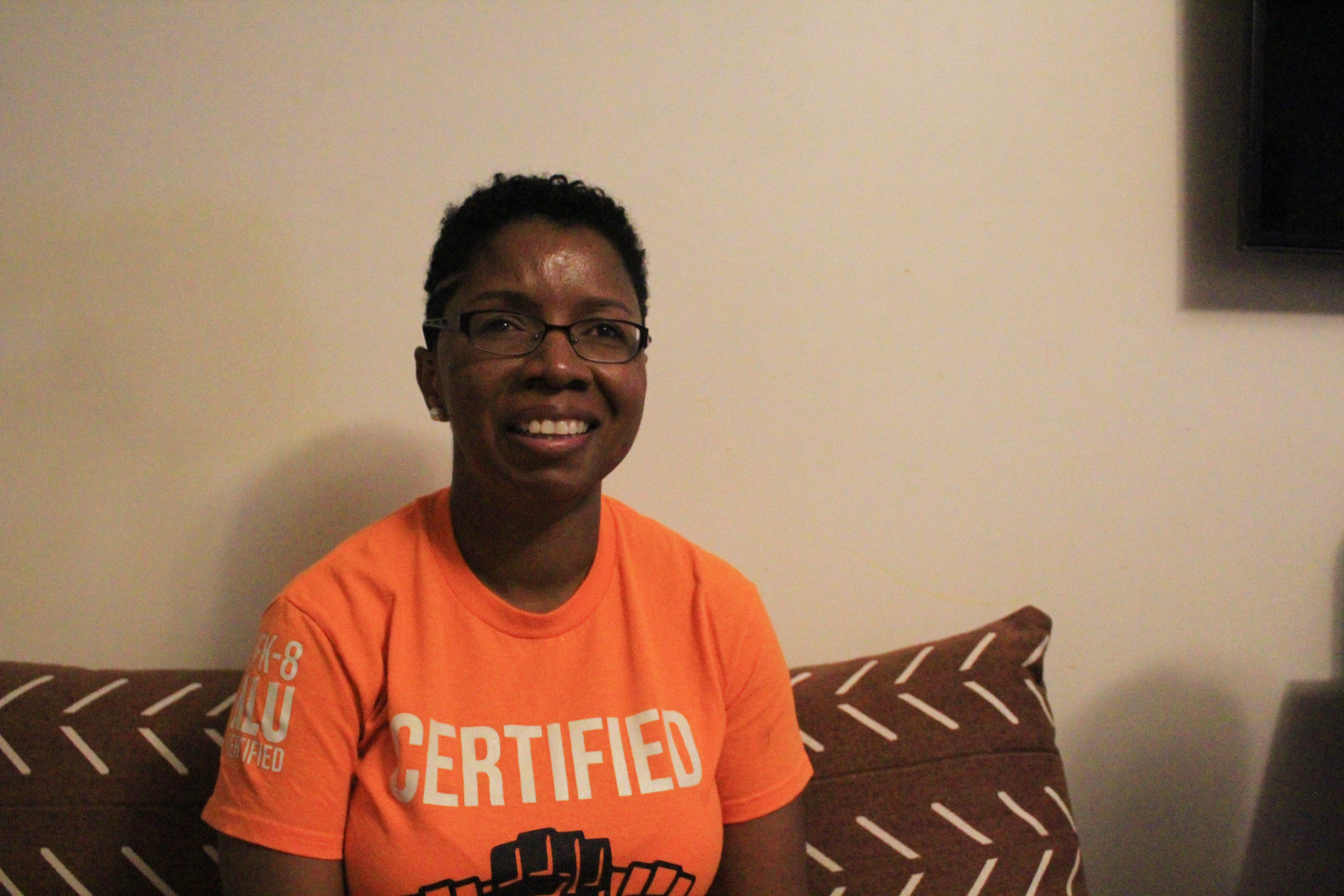Two months after Amazon opened a warehouse on Staten Island in 2018, Rina Cummings applied to work there. “I was like, that’s it. It’s the one place that can probably give me reasonable accommodations and is large enough that I can find something to do,” Cummings said.
She needed those accommodations because Cummings is legally blind — a result, she says, of contracting fungal meningitis a few years ago.
Cummings worked for more than five years at the center, checking and scanning packages on a conveyor belt before they left the facility. She was already visually impaired when she applied to Amazon in 2018, and she says she was assured that the company would make accommodations.

Rina Cummings now works at Amazon Labor Union. (Credit: Nandhini Srinivasan)
However, she said, she never got the promised support. “The accommodation was, I was allowed to work in the building, and I did the same job. They didn’t switch me around to different things. But that was it,” Cummings said.
In March, she was fired; she was told she’d taken too much unpaid leave for a case of bronchitis. She appealed to the company, but that went nowhere. So she filed an Unfair Labor Practices (ULP) charge with the National Labor Relations Board (NLRB) in April. As a board member with the Amazon Labor Union, she regularly helps other employees file charges with the NLRB.
Cummings is one of more than 100 Amazon employees who, in the year and a half since workers at the Staten Island facility approved the union, have filed complaints with the NLRB. More than two-thirds of those employees allege wrongful dismissal, while others cite coercive threats or unfair actions against members.
When asked for comment, Amazon asked for the names of employees who spoke to a reporter, but did not comment on specific claims. Spokesperson Sam Stephenson said that the company is “committed to matching meaningful temporary work to employees so they can remain actively working while recovering from a work- related or non-work-related injury or illness.” Employees who feel they’ve been unfairly treated can call the company’s ethics hotline, he added.
Under the Americans with Disabilities Act (1990) (ADA), it is illegal for employers to discriminate against workers with disabilities, deny them employment opportunities or reasonable accommodations at the workplace. Last year, employees across the U.S. filed more than 25,000 charges alleging ADA violations with the Equal Employment Employment Opportunity Commission.
Amazon has faced scrutiny from other agencies — public and nonprofit — for its treatment of workers with disabilities.
In May 2022, the New York State Division of Human Rights filed a complaint against Amazon, alleging discrimination against pregnant workers and workers with disabilities by denying them reasonable accommodations. The department also alleged that Amazon has policies that force pregnant workers and workers with disabilities to take unpaid leaves of absence rather than allowing them to work with reasonable accommodation. A date for a hearing with an administrative law judge is yet to be announced.
In July, a worker-advocacy group called United for Respect released a report alleging that Amazon has made it harder for workers with disabilities to get accommodations, while getting tax credits for hiring them. The report, which relied upon interviews with workers across the country, said that employees with disabilities experienced difficulties accessing the company’s accommodations policy, and that they experienced discrimination from managers or supervisors who were unaware of or chose to ignore accommodations.
A spokesperson for Amazon previously told Bloomberg Law it was reviewing the charges in the report, and added that United for Respect was “union-created and funded.”
Earlier this year, Amazon was named “Best Place to Work for Disability Inclusion” in the Disability Equality Index (DEI), organized by the American Association of People with Disabilities (AAPD), the nation’s largest disability rights organization, and Disability:IN, the global business disability inclusion network. Amazon is listed as a corporate partner on the Disability:IN website.
Cummings said her only accommodation was that she didn’t get rotated to different roles in the facility.
It was a high-pressure role. She said she had to inspect and pass on at least 1,400 to 1,800 packages an hour, checking for labels and defects before they left the facility. Any delays — including those such as packaging issues, which were beyond her control — might cause a worker to be penalized or fired, she said.
Her vision problems made the job more difficult, and she says that the company promised but didn’t provide an oversized monitor or special software that might’ve eased her workday.
Eventually, Amazon provided a regular-sized monitor but it wasn’t enough, she said.
“For almost three years, I had to rely on my co-worker to log me in with my ID badge. I started to study the different meanings of what the beeping sound means, or rely on my neighbor to help me fix the problem,” Cummings said.
Other employees have faced difficulties. Ronald Boone, who has worked at Amazon for nearly five years, said that his job initially required him to climb up and down a ladder with packages in “less than five seconds.” One day, early in his employment, he slipped off a ladder and injured his knee, requiring him to get reconstructive surgery, he said. He paid for this with his personal insurance since he didn’t know he could apply for workers’ compensation.
In 2019, he qualified for long-term leave and was paid 60 percent of his salary. He was called back toward the end of the year and assigned desk duty for three months. After, he says, Amazon told him that the accommodation had expired, and he could “either stay at home without pay until they found another job for me … or go to work and try to tough it out with some type of accommodations.”
Boone says he chose to “tough it out,” but it was a constant struggle for months to get an accommodation for light duty and a stool to sit on. Last September, he suffered another knee injury. This time, he’s applied for workers’ compensation. But he was soon told by Amazon that there were “no TLD (temporary light duty) positions” and he would have to take an unpaid leave of absence.
Danielle Hayden, who was born with cerebral palsy, is pursuing a complaint with the NLRB alleging wrongful dismissal. She filed a charge in February after working for more than four years at Amazon, where she rotated to various jobs including packing, moving products and ensuring workers’ stations were fully equipped with supplies. It took her around five months to get accommodation stating that she couldn’t lift more than 10 pounds, but she says that she continued to face difficulties with management.
“Certain managers didn’t want to acknowledge and adhere to my weight-restriction accommodation.” she said. “Managers wanted to just not acknowledge or respect the accommodation.” Hayden said she was also targeted for not meeting her quota and for “moving too slow.” She said she was fired earlier this year, and the company denied her request for appeal.
The conditions were brutal, she said.
“When you’re disabled, they don’t let you sit down — you don’t get a chair. They want you to stand on your feet for 11 hours,” Hayden said.
About the author(s)
Nandhini Srinivasan is a student at the Columbia Graduate School of Journalism.



